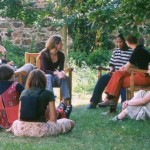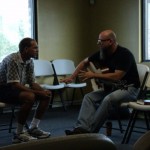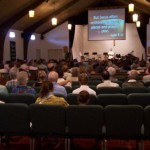The place of teaching when the church gathers
When you talk with someone about church today, it’s hard to keep the conversation from shifting to the church gathering (i.e., “worship service”). This is true even among people who admit that the church is people (that is, people who are following Jesus). Still, people often equate (or at least closely associate) church with a specific gathering of people.
Similarly, when discussing gathering with the church, it’s hard to keep the conversation from shifting to some form of teaching (usually in a lecture form called “sermon” or “homily”). In fact, just as church is often associated with a specific gathering, the gathering itself is often closely associated with a sermon or another form of teaching.
However, in my post “What is teaching from the perspective of Scripture,” I said that teaching in Scripture is not about sharing information but about demonstrating how to live for Christ and helping others live that way of life. Obviously, very little can be demonstrated while teaching during church gatherings. (Like I said in the post above, “application” is not the same as demonstration.)
So, what is the place of teaching when the church gathers?
First, we should recognize that in Scripture teaching is only one form of interaction between people when the church gathers. And, beyond it being only one form of interaction, it is not given a prominent place. One of the only places in Scripture where teaching (“instruction”) is specifically mentioned in the context of church gatherings is in 1 Corinthians 14. However, even in this case, teaching is only one among a list of activities, and it is not one of the activities that Paul chose to focus on. (There may be a reason that Paul chose to focus on “prophecy” and “tongues,” but he doesn’t tell us that reason in his letter.)
Second, whether we teaching using lecture, dialog, discussion, case studies, or some other method, we should recognize that these kinds of teaching are only the beginning of teaching in the perspective of Scipture – and only a small step at that. If someone only interacts with others through these kinds of teaching methods, then that person is not teaching by demonstration (like we see in Scripture). (Yes, I believe that some forms of teaching are better for sharing information than others forms. But, any of those forms are still types of sharing information, not methods to help people walk in Christ as a way of life.)
Finally, we should recognize that if we truly desire to teach one another, then we must also grow to know one another more and more and share our lives with one another. Real life is the context for teaching in the perspective of Scripture. Anything that is shared while the church gathers only becomes “teaching” when it demonstrated in the context of real life and others are helped to live accordingly.
I understand that it is popular to closely associate caring about Scripture or learning from Scripture with certain forms of teaching (sermons, for example) or certain contexts for teaching (during the church gathering or worship service, for example). However, this is not a valid (or at least a unique) association. It is much more “scriptural” to associate caring about Scripture with helping others live according to what we find in Scripture.
What would you add to my discussion of teaching while the church gathers? Have you experienced this kind of teaching before?
Mutual Participation: Dip your toes into the waters or dive into the deep end?
For the last two days, I’ve been trying to decide what to do with Art’s latest comment on my post “Replay: How do we edify others?”
First, I think the comment is a well-articulated comment and a necessary component of our discussion of edifying one another when we gather with the church.
Second, Art’s comment is another indicator that he should be writing this stuff for his own blog… but then I need to keep my mouth shut so that he continues to leave the comments here.
I thought about copying Art’s entire comment, but I decided to continue the discussion by asking a question… which I’ll get to by the end of this post.
In the comment, Art is talking about participatory meetings. Now, for most Christians, church gatherings are not a time of real participation. They primarily gather to hear from others, and usually they hear from the same person week in and week out.
Some churches move toward more participatory meetings by having different people speak from week to week, or by encouraging comments or questions after the speaker is finished.
Other groups of believers move along the spectrum toward mutual participation by having a discussion about a specific topic or passage of Scripture.
Finally, some groups come together without a preplanned topic or passage.
Now, if a group of believers recognizes that mutual participation is beneficial for the church, and if that same group of believers recognizes that they do not all participate when they gather together, what should they do? Should they take steps toward mutual participation (perhaps along the spectrum that I described above), or should they jump in with both feet directly into all participating without a preplanned topic or passage?
This is the question that Art poses in his comment:
Doesn’t our best attempts to move past the pastor controlled meeting space still deny committing one another to the care and capability of the Spirit in contributing to one another when assembled? Wasn’t this something Paul was very quick to do with pagans only recently converted, leaving them on their own after a few weeks or months without “leadership?” Do the saints, in fact, need us and not the Spirit, to help them begin to “participate” so narrowly? I suppose I’m advocating “throwing the meeting in the deep end of the pool to learn to swim together,” but this seems to be the biblical pattern.
As you can see, I borrowed Art’s swimming analogy for this post.
So, what do you say? If a group desires mutual participation for the sake of helping one another grow in Christ, is it better to take small, incremental steps by adding more and more participation? Or is it better to scrap all facilitators and plans in order to provide opportunities for mutual participation immediately? Why?
When every part of the body of Christ functions together
Josh at “Called to Rebuild” has written another excellent post. This one is called “Missing the church.”
He begins by explaining that many close friends have been transitioning out of his life lately. Josh feels the loss… and that along is an amazing thought. In a time when “church” has become just another activity, it is a real family for Josh.
Next, he describes a time when God began to show him what could happen when the whole body of Christ worked together. He writes:
Anyway, as I sat there listening something just came over me. Tears welled up in my eyes. Nothing being said was at all specific to my trial at the time, but that didn’t matter. In a way I can’t adequately explain with words, I saw Christ being revealed as I listened to the brothers and sisters sharing. It was powerful. All the pressure from the burden in my heart was like a great big logjam, but as I beheld Christ through the functioning of His Body it was like a mighty river came bursting through the channels of my heart, forcing it all to the surface and clearing it away.
Josh refers to 1 Corinthians 14:24-25. While Paul writes about an unbeliever recognizing the presence of God among the church because everyone is prophesying, I can see how it would apply to Josh’s situation too.
As I read Josh’s post, I love this statement: “[A]s I beheld Christ through the functioning of His Body it was like a mighty river came bursting through the channels of my heart, forcing it all to the surface and clearing it away.”
Reading that, it’s easy to understand why Josh would say that he misses his brothers and sisters in Christ.
Some Simple Thoughts about our Church Gatherings
My friend Chris blogs over at “Simple Thoughts“… and thus the title of this post. I want to point you to a post he recently wrote called “Normal.”
Chris shares some of the things his family has been going through recently – specifically related to wife’s ongoing health issues. However, he also gives a brief description of our church gatherings.
You see, a few weeks ago, Chris and his family starting gathering with us on Sunday mornings.
This is the way that he describes those times of meeting together:
Now they conduct church different than the norm. There is no loud bands or video presentations, or people talking and carrying on hundreds of different conversations. This is a small community, of faithful God fearing people wanting to learn more about the Scriptures than what is preached at the pulpit, or discussed in the 1 hour (really 30 or 45 min) Sunday school class. They set out folding chairs in a small room. There is no pulpit. They have hymnals spaced about on about every other chair. They use their hymnal and select songs that have been on their heart. There is not one person selecting songs, it is a community choosing songs. Either before or after each song selected, the person that chose the song, expresses why they chose that song. Usually it is due to being their favorite, or it is because sometime during the week or lately, that song has touched their heart during a situation in their life. They pray, and then they discuss scripture. Yes, there is someone who is leading the discussion. But he is not there to state how it applies to him but all understand there is one meaning and many applications. So we get to hear the different applications that pertain to that different part of scripture. There is no time limit on the discussion. Then they pray over prayer requests that are shared and eat together afterwards. Keep in mind, there is no nursery, or children’s church. These are families, gathering as families, to share life and scripture.
I was really concerned more about what my teen children were thinking about the whole gathering. Come to find out they enjoyed it. They stated that they do not walk away confused but understand the scripture better, because they here different perspectives to the application of scripture. This allows them to hear from different people, mainly adults, on how they have applied scripture to their lives in order to glorify God.
I appreciate Chris writing about us. I had a chance to talk with him about the last part of his description – mainly, the benefit of several people speaking, teaching, encouraging, etc. when we gather together. Hopefully, I’ll have time to write more about that soon.
Like I’ve said before, I describe us a “hybrid” – somewhere between the more traditional, institutional side of the church and the more organic, simple side. Of course, that just means that our gatherings tend to frustrate people from both sides. That also means that our gatherings give us constant opportunities to not only edify one another, but also to give up our own preferences for the sake of our brothers and sisters – whether those preferences lean toward the organic side or the institutional side.
What’s wrong with those young people?
Everybody is worried about the teenagers and twenty-somethings, especially those who are growing up “in the church.” Why are they worried? Because they are not staying “in the church.”
Survey after survey, poll after poll, count after count returns the same result and asks the same question: Young people are “leaving the church” and “Why?”
The latest article that I’ve read about this phenomenon is at “Out of Ur” and is called “The Religious Views of 20-Somethings, Part 1.” (Since this article is called “Part 1,” I would assume there will be a “Part 2” eventually.)
This study is slightly different in that it was written by World Religions professor and is based on essay questions written by his students. This is how he describes the exercises:
Last semester I assigned the students in the community college World Religions course I teach a series of writing exercises that (I hoped) would help them personalize and internalize the subject matter we were reading about and discussing in class. There were four assignments total, one every four weeks or so. And each was a little more probing. My goal was simply to get these students from diverse religious backgrounds thinking about their experience with religion, assumptions about religious claims, how they understand the role religion plays in their lives.
The author (professor) admits that this is not a scientific study, but I think the answers that his students left on the essay questions are extremely enlightening. There is one point that I think is especially interesting:
In the first assignment, the students wrote about their experience with religion from their earliest memories to the present. Interestingly, most of them had overwhelmingly positive experiences with religion as young children. Some of them expressed being bored or confused during services—temple, mosque, synagogue, or church. But none of them reported leaving the faith of their youth because they had a traumatic experience or because they ultimately disagreed with the community’s teaching. Rather, most of them just stopped going. One week they went; the next week they didn’t. Services didn’t make any real difference in their life.
Think about this last statement for a minute: “Services didn’t make any real difference in their life.”
Guess what? Religious services will never make any real difference in anyone’s life. Yes, for previous generations, there was importance attached to these religious services, whatever religion or tradition or background we may be talking about (Christian and nonChristian alike). However, it was not necessarily the “religion” of the service that caused it to be important. Instead, it was the community aspect.
The religious services of the previous generations were important because they were shared experiences of a local community, typically people who lived in the same vicinity as one another.
Not anymore. Today, people drive for 10, 20, 30 minutes… even longer… to attend religious services with people that they only see during those events. Now, people sit beside strangers to observe religious services. There is nothing special about them because the shared community aspect is gone.
So, what’s the answer? Well, according to most studies, the answer is to make the services “relevant.” In fact, the title of the paragraph that I quoted above is “Religion irrelevant.”
However, if you read the information closely, you’ll see that “religion” (or, spiritual beliefs, at least) is not irrelevant to these young people. They all have spiritual beliefs. In fact, for the most part, they did not report feeling hurt by religion or disagreeing with their religion.
Instead, according to this professor’s limited study, these young people “left the church” for one simple reason: “Services didn’t make any real difference in their life.”
Do you want to see young people (or older people for that matter) hang around and actually grow in their faith and spiritual beliefs? Then, start making a difference in their life. You can’t do that from a platform. You can’t do that from a lectern. You can’t do that from an office or from behind a desk.
If you want to make a difference in someone’s life, then you have to share your life with them and encourage them to share their lives with you. It takes real, intimate relationships. This is what previous generations had with the people who lived nearby (community). It’s what young people are not finding among the church today.
New Year’s Eve and New Year’s Day with the Church
Have you ever heard of a “Watchnight Service” where people read through the entire Bible on New Year’s Eve / New Year’s Day? Yeah? Well, we didn’t do that. (Now, I know there are other kinds of “Watchnight” services. But, that’s the kind I always heard about growing up.)
But, we did get together with the church on New Year’s Eve and New Year’s Day to read and discuss Scripture, among other things. (Actually, over the weekend we gathered together with the church several times besides the two instances that I described here. But, in this post, I’m going to focus on these two times of gathering.)
As I mentioned in my post “Reading Scripture Together with the Church on New Year’s Eve,” we gathered together on Saturday, New Year’s Eve, with some brothers and sisters to read through the books of Jonah and Mark.
We began gathering together just before 7:00 (7-ish) at the home of some of our friends, and, of course, we immediately began grazing on ham and cheese rolls, meatballs, raw vegetables, several flavors of popcorn, different cheeses, cookies, and other assorted “finger foods.” About half of the people present were brothers and sisters that we gather with weekly. However, there were a few friends and friends of friends who joined us well. A couple that we had never met even drove in from the Outer Banks (NC) to spend the weekend with us (you know who you are!), and we had a great time getting to know them!
Eventually, we started reading together. We read through the book of Jonah (4 chapters) and the first 4 chapters of Mark. Then we took a short 10-15 minutes break for food, stretching, etc. After the first break, we read Mark 5 through Mark 10 and took another short break. Finally, we read Mark 11 through Mark 16. Twenty-one different people read (two people split a chapter), including several children. We also read from different English translations.
We tried to refrain from discussing the Scriptures as we read them, but we found it terribly difficult! We ended up talking a little… but not much.
Then, on Sunday, New Year’s Day, we gathered for our normal weekly meeting. Of course, many of the people who gathered with us Sunday had been present when we read Jonah and Mark together. Others had not been with us when we read together New Year’s Eve.
But, we had decided to discuss the two books on Sunday. So, after singing a few songs – accompanied on guitar by a friend who spend the day with us before returning home to Virginia – we began talking about Jonah followed by a discussion of Mark.
I won’t go into what we discussed. It was extremely encouraging and challenging. I may write something about this later.
As a new friend said to me in an email:
Was Jesus there? Obviously! How do we know? Because the truth was there being spoken, taught, and discussed; because family was there sharing struggles and thanksgivings, and sorrow, bearng one anothers burdens; because the body was there speaking truth in love to build one another up.
This was a great way to spend New Year’s Eve and New Year’s Day.
Reading Scripture Together with the Church on New Year’s Eve
When we gather together with the church, we often read and discuss Scripture together. Typically, we will read at least a chapter of Scripture together; sometimes we will read even more.
If we’re studying through a shorter book, we’ll read that book in its entirety each time we discuss it. We’ve done this with Philippians, Colossians, and Ruth (and perhaps others). In each case, we studied each book once a week over four or five weeks, and we read through the entire book each time. So, after a month or so, we would have read through those books 4 or 5 times together.
But, occasionally, we get together to read even more Scripture together in one gathering. Previously, we’ve gotten together to read the Gospel of Luke and the Gospel of John. When we read through these longer books, we typically read a few chapters at a time, with someone different reading each chapter. Then, we take a break to share some food and conversation. We repeat that cycle until we read through the entire book. Of course, these gatherings usually last 2-3 hours.
We’re planning to gather together again this Saturday night (yes, Saturday night) to read through Scripture again. But, this time, we’re going to read through two entire books of Scripture: Jonah and Mark. Yes, Jonah is a shorter book in the Old Testament, and Mark is one of the four Gospels in the New Testament, but I think the combination will work well together.
If you are in Raleigh, Wake Forest, Youngsville, or the surrounding area, you are welcome to join us. For that matter, if you’re willing to travel from wherever you are, you are welcome to join us. Just get in touch with me at aknox [at] sebts [dot] edu, and I will give you more information.
By the way, we will not discuss the books of Scripture much on Saturday night. However, we do plan to talk about these two books together when we gather together again Sunday morning. It will be interesting to see what insight people bring to our discussion after reading through both books at one time.
What do you think about reading entire books of Scripture together as the church?
How Big is Too Big for the Church?
My good friend Eric at “A Pilgrim’s Progress” is asking a very good question in his post “What Size Should a Church Family Be?”
(If you haven’t met Eric yet, he and I have known each other for about 9 years. Recently, he resigned from his job as a vocational pastor because of some convictions based on his study of Scripture.)
Eric begins where my previous post stopped: the purpose of the church gathering is mutual edification. If, then, we are to gather to edify one another, is there an upper limit on the number that can gather together? That’s the question that Eric asks.
He says:
What about the upper end? In our country right now the answer tends to be “bigger is better.” Another common way of thinking is that size doesn’t matter at all. I disagree with both these conclusions…
What about 30? I believe this is roughly the upper end. I freely admit that this conclusion is based partly on my own experience. I’ve read others who come to both higher and lower conclusions than 30. However, in my experience 30 is roughly the upper end that can fully participate in a gathering to bring about edification.
Like I told Eric in the comments, I’m not smart enough or brave enough to suggest a number. But I agree that mutual edification should be the principle that drives our gathering. If there are too many people gathered together to work together to help one another grow in spiritual maturity, then there’s a problem.
After I left my comment on Eric’s post, I began to wonder something… Is one of the causes (of desiring larger and larger church sizes) the fact that we are more interested in gathering together than we are in going out?
We all build, but not in the same way
If you peruse the posts (old and new) on this blog, you’ll find that I write often on the subjects of church gatherings and mutual edification. Why? Well, for one thing, for my PhD dissertation I am studying mutual edification as the purpose of the church gathering together from the perspective of Scripture. For another thing, well, I think the church should all work together to build up one another in maturity in Jesus Christ whenever we meet together. (Which, of course, is why I’m studying that subject for my dissertation…)
Earlier this week, Dave Black wrote a short post that touches on this subject. This is part of his post from Monday, November 14, 2011 at 1:35 p.m.:
Paul made it clear that all of the Colossian believers were to teach and admonish one another (Col. 3:16). The author of Hebrews makes the same point when he writes, “Exhort one another every day” (Heb. 3:13). The message is clear. All Christians are Body-builders (they are to “edify”), but we do not all build in the same way. The New Testament envisages that all Christian disciples will be involved in the “work of the Lord” (1 Cor. 15:58). According to Paul, every member ministry is the normal Christian life.
As he points out, there are many exhortations, principles, and examples in Scripture that indicate that all believers should work together (“mutual”) to build or strengthen the church (“edification”). (By the way, Dave only lists a few of the many passages that point toward mutual edification.)
Similarly, and as he also points out, “we do not all build in the same way.” This is especially clear in the passage of Scripture in which the authors discuss spiritual gifts. But, there are other examples as well.
Think about these two points carefully. There is a reason that we do not all “build” in the same way. We all need to be “built” in different ways. Some may need more of one kind of construction and strengthen than another kind, but we all need many different kinds edification.
We need different kinds of “construction” so we also need different “construction workers.” One person cannot and must not attempt to do all of this work. The body of Christ is not designed to work in this way.
Imagine a dilapidated house… a shack perhaps… about to fall in on itself. It needs much work. It needs carpentry work, electrical work, plumbing work, roofing work, etc. A carpenter cannot do all of the work. An electrician – even a master electrician – cannot do all of the work.
In the same way, in order for the church to be built up (edified), it is necessary for every follower of Jesus to take part in the work of building up.
When you gather with the church, do those gathered understand that the goal is edification of the whole body? Who is expected to do the work of edification? Who is allowed to do the work of edification?
Gotta keep the main thing the main thing… and the main thing is the Sunday event?
Hamo at “Backyardmissionary” is doing some reflection in his post “Get Sunday right and the rest will take care of itself.” In fact, he’s reflecting back 9 years to his very first blog post that had the same title: “Get Sunday right and the rest will take care of itself.”
Now… he’s not so sure. He says that way of thinking was naive, foolish, absurd.
There are several good parts of his post, but I’ll point out a few:
I really cannot imagine Jesus and the apostles ever sitting around during the week and asking the question ‘ok – how are we going to do sabbath this week?’ I don’t see from the NT that their lives revolved around the planning and execution of one major weekly event.
Surely they would have told us about it if it was that important?…
Hmmm…
But I do see that their lives revolved around tight relationships with each other and around questions of how they lived out their radical devotion to Christ in the world they were a part of. I see them very focused on living and demonstrating the kingdom of God in many different ways thru everyday life.
————————
Jesus called us to a life – a life in community – and that will inevitably involve meeting, but I would forgive anyone who interpreted Christianity to be a weekly commitment to a Sunday event – because so much of what is communicated (often unconsciously) is exactly that.
————————
However shifting people’s deeply entrenched understandings of church, mission and the kingdom is something I baulk at because it inevitably involves pain and conflict. It inevitably involves being misunderstood and maybe even cast in the light of a villain who just wants to screw things up. And very few people are intentionally obstructive – its just how we have been trained to think…
So some days I sit and wonder. Is it worth it?
I know that getting Sunday right is not the answer but the primary platform to speak to this expression of church is… you guessed it… Sunday…
Is the solution part of the problem?…
I love these kinds of posts: honest, passionate, filled with the real pain and struggles of life. Yes, for most of Christianity, the Sunday event is the main thing… I’ve even heard the “Sunday morning worship service” referred to as “the main event.” (Oh, I know that most Christians would say that Jesus is the main thing…)
So… if most people think that the Sunday morning worship service is “the main thing,” is it possible to communicate otherwise outside of that event? Isn’t anything said or done outside of that context considered to be less important, less normative, less Christian?
Or, is there another solution? Is there another way to teach people that the Sunday morning worship service is not the pinnacle of following Jesus?










